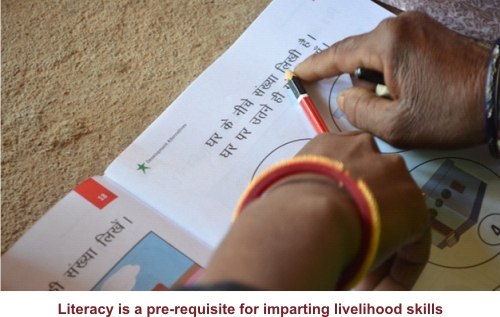|
Functional Literacy for Better Livelihoods
Literacy, whether achieved as the core of schooling in childhood or through learning later in life, is the passport that allows an individual to participate in contemporary social, economic and political development. There is considerable optimism about India's recent economic development. However, India's progress in terms of adult literacy and lifelong learning has been a bag of mixed success. On the positive side, there has been a substantial shift and increase in adult literacy rates, from 61% in 2000 to 72.2 % in 2015. On the negative side, India is still home to a considerable 340 million illiterate adults, 172 million of them being women. Even after more than half a century of independence, there exist marked disparities within India, which make some sections of the population highly vulnerable. In addition to the rural-urban divide, the caste, class and gender disparities result in many people of one country living in vastly different worlds in terms of health, education and other development indicators.
The intersection between training in
livelihood skills and basic education for illiterate and semi-literate
youth and adults has also not been explored to a desirable extent. Is
literacy a prerequisite in preparation for training in livelihood or
income-generation activities or can livelihood programmes run separately
from literacy programmes and have the desired effect requires answering.
This article tries to answer these questions, stressing upon how literacy and skill development have a substantial impact on poor people's livelihoods, while trying to establish how literacy programmes need to be coupled with components of livelihood preparedness and livelihood skills to have the desired effect, citing learnings from Development Alternatives' flagship adult literacy programme, TARA Akshar+. The TARA Akshar+ functional literacy programme for adults is not merely a delivery of functional literacy to women, but also has components of livelihood preparedness and livelihood skills, including health awareness and financial literacy. This combination of literacy and livelihood preparedness has demonstrated changes in the livelihood patterns of its learners. Firstly, there is a widely noted 'empowerment effect'- that learners acquire enhanced confidence and social resources which help them take initiatives to improve their livelihoods. Second, literacy and numeracy skills are a clear advantage in market transactions in an informal economy like India. Then, there is the creation of a sense of identity for the learners, a feeling of becoming self-reliant, within their households and their communities. It has also been noted during the delivery of this programme that literacy is a prerequisite in the preparation for imparting livelihood skills or income-generation activities. It has been observed, basis interactions with the learners and beneficiaries of the TARA Akshar+ programme that training in livelihood skills and income generation is the longer-term aim, but people are encouraged not to start training in a particular livelihood, until they have first mastered reading, writing and calculating sufficiently to cope with the livelihood's operating and development requirements. There is a planned progression between the two. It has also been observed, however, that leaners are also not merely satisfied having acquired functional literacy and demonstrate a continued need and desire for skill building and livelihood training to enhance their income-generation abilities. Experience from these learnings has produced a strong consensus that literacy programmes and livelihood skill programmes separate from each other are not as successful as ones that have necessary components of both. Learners feel more comfortable while acquiring livelihood skills if they can read, write and do simple arithmetic. Also, literacy programmes that have content of literacy derived from or influenced by the livelihood component appeal more to the learners as they can, after all, demonstrate an immediate reason for learning. ■
Akash Vohra
|
